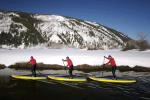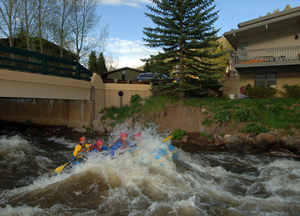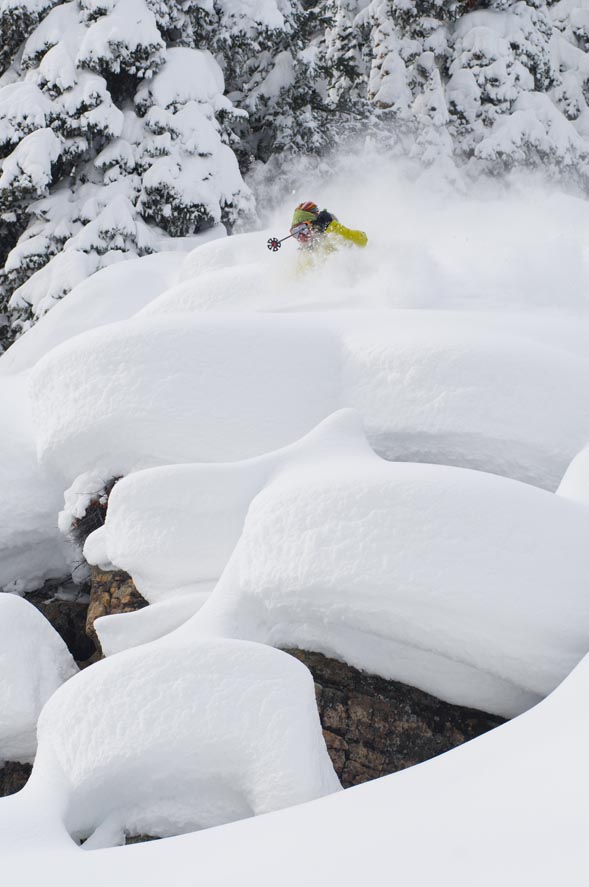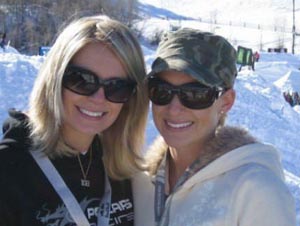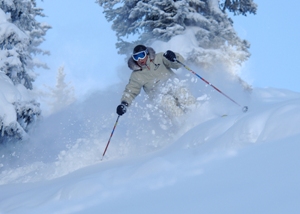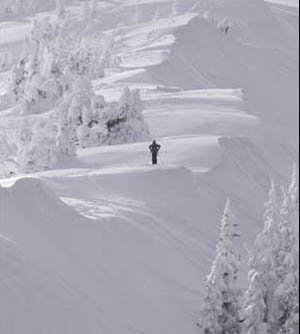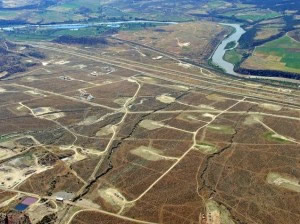
Courtesy of Garfield County
Tanker truck crash, mercury storage plan, Estonian nightmare underscore energy concerns
August 2, 2009 —
We tend to feel a little sheltered here in our high-country paradise -- that is until the outside industrial world intrudes in a shockingly ugly way.
A week ago Sunday a tanker truck blew a tire on Interstate 70 and rolled over in Edwards. The threat of lightning and potential for a rupture and blast-furnace of a fire led to a justifiably cautious cleanup that shut the highway down for 11 hours.
The truck was headed from the rich natural gas fields just to our west to Denver for processing. So while we may not see the immediate effects of "drill, baby, drill" here in Eagle County, the spillover can definitely adversely effect our lives.
So think twice if you're eagerly awaiting an upward spike in natural gas prices. And on the flip side, if you're looking for further evidence that oil shale production is — or at least should be — a nonstarter on Colorado’s Western Slope until oil and gas companies radically refine the massively water-intensive process, conservationists say there’s no better example than Estonia.
The world’s leading producer and consumer of oil shale — generated by superheating organic kerogen trapped in rocks in sand — Estonia has seen some serious environmental problems over the course of 80 years of production, according to a study published in the journal of the London-based Royal Society of Chemistry.
Besides “voluminous dewatering,” the chief concern in arid Colorado, oil shale production in Estonia leaves huge heaps of residual limestone, ash piles and semi-coke, and the power plants that consume oil shale emit above-average amounts of carbon dioxide, while “the groundwater regime, and often also the water quality, are altered in mined-out areas.”
If that doesn’t sound scary enough to seriously question risking Colorado’s fragile mountain environment, consider this quote from the report titled “Environmental problems in the Estonian oil shale industry”:
"Oil shale waste and waste heaps may be considered a rather innocent production residue; however, from time to time they are subject to self-ignition."
The Western Slope of Colorado is currently a massive tinderbox as a result of an ongoing mountain pine park beetle infestation that has killed nearly 2 million acres of lodgepole pine forests. Self-igniting waste heaps should probably be avoided at all costs.
To be fair, the report states the worst of Estonia’s environmental degradation occurred during the 1980s — about when Exxon was packing up its oil shale camps and heading out of town in Colorado, leaving thousands out of work overnight — and that things have improved a bit since. But much work clearly remains, and many conservationists question pumping billions into oil shale research instead of bolstering renewable production.
So transforming Colorado into Oklahoma via the oil shale industry may be a goal of Republican U.S. Sen. James Inhofe (see his recent dust-up with our Gov. Ritter), but surely even he would draw the line at turning the Centennial State into the second coming of Estonia.
Speaking of, Ritter made his opposition to mercury storage near Grand Junction official Thursday, sending a letter to U.S. Energy Secretary Steven Chu opposing the plan for three key reasons:
First, he said the Grand Junction Disposal Site south of the city is too close to the Colorado River and contamination puts far too many water users both in state and downstream at risk.
Second, transporting mercury from its current storage facility in Tennessee presents far too many risks, crossing numerous waterways and the Continental Divide.
And finally, the feds promised the Grand Junction Disposal Site would only contain locally generated uranium mine tailings and not become a toxic dumping ground for the rest of the nation.
Ritter made his opposition to the plan known the week before, but now he’s throwing his considerable weight with Chu and the Obama administration on energy issues into the fray.
His two Republican opponents for governor in 2010, state Sen. Josh Penry and former congressman Scott McInnis, both of Grand Junction, also made their opposition known last week.
Yeah, I think we can all get on-board with just saying no to loads of mercury coming down Loveland Pass. That would make our recent oil tanker crash look like a Sunday barbecue.
And finally, any Coloradan who’s spent a significant amount of time living or working back east knows how difficult it is to duplicate the true wilderness experiences one finds in the wide-open spaces of the Rocky Mountain West.
There are places, like along the Appalachian Trail, where a few precious hours of natural solace can be snatched from the swirling insanity along the Eastern Seaboard, but even then the crush of humanity is never far at bay.
So it’s disheartening even for Westerners to hear about the industrial intrusion that will result from natural gas drilling in the Marcellus Shale, described in a New York Times editorial observer piece as week ago as a “subterranean layer of rock that runs from the Lower Adirondacks down through the Catskills and to western Pennsylvania and eastern Ohio.” That’s a big swath of some of the last good woods in the Mid-Atlantic region.
The author, Verlyn Klinkenborg, brings that same sense of dismay westerners are feeling in the wake of a decade-long natural gas boom in Wyoming and Colorado — in places once thought so remote industrialization wouldn’t matter:
“I’ve seen all of this before in the explosion of coal bed methane development in Wyoming over the past decade. The same arguments have been advanced — energy independence — and the same alternative, a sober national approach to energy conservation, has been ignored.
“It takes a reasonably practiced eye to see the damage coal bed methane development has done. But when the infrastructure for pumping natural gas out of the Catskills has finally been put in place, there will be no mistaking its impact — no missing the gaping holes in the forest canopy, the artificial ponds full of “fracking” fluid, the industrial damage done.
“The estimates of the energy trapped below ground in the Marcellus Shale are indeed staggering. But to get that energy, we will have to give up a good share of the biological integrity of the land that lies above it. To stand in a glade in the Catskills is to realize what a deeply troubling trade-off that is.”
Sub Roan Plateau for Catskills and this piece perfectly describes the way a lot of Coloradans are beginning to feel.
![]() 2 Comments on "Tanker truck crash, mercury storage plan, Estonian nightmare underscore energy concerns"
2 Comments on "Tanker truck crash, mercury storage plan, Estonian nightmare underscore energy concerns"
L. Chapman — August 2, 2009
I think the oil barons are having a hard time adjusting to modernization!!! There just has to be an easier & safer way to energize our country! We must operate on a cleaner & greener platform!! This country has some of the smartest folks on the planet!! The oil industry needs to listen to them & implement their good ideas!! The sooner the better!! Lest we all suffocate !!
J Schwartz — August 3, 2009
It's not that the oil and gas industry are not listening. They have heard and we have their response.
The history of extractive processes, be it iron and copper in Northern Michigan or coal in the Appalachians is the same. Get the money and get out of town leaving it for others to deal with the aftermath.
The oil, gas barons are doing what robber barons have always done.
Local citizens saying NO long and loud to their neighbors, the press and to legislators can make the difference. It won't be easy. There's lot of money on the other side and indifference all around.





